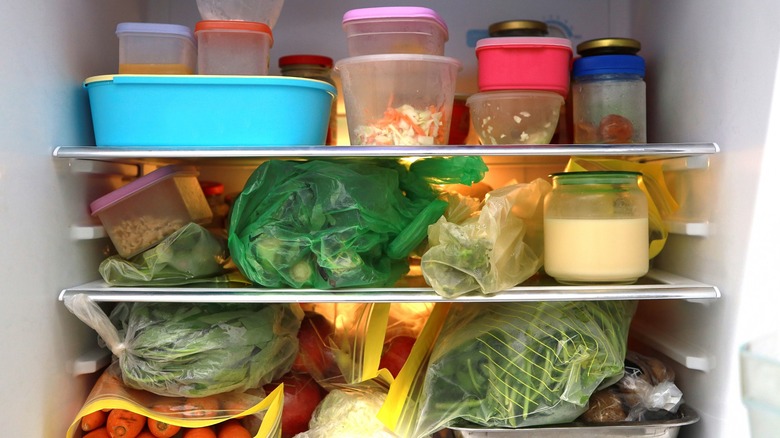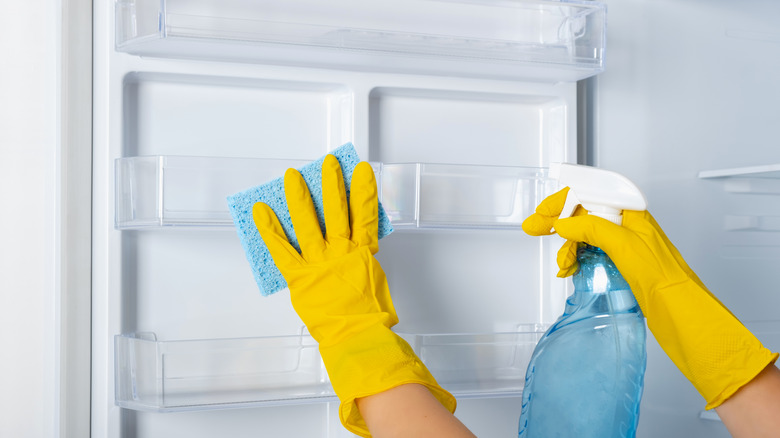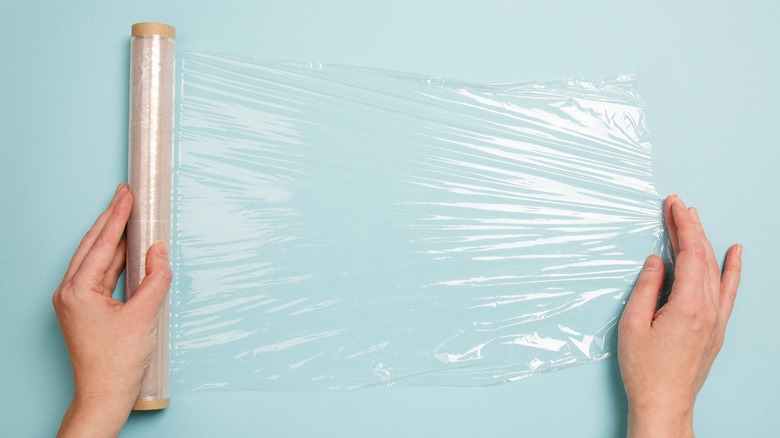The Plastic Wrap Hack To Keep Stuffed Fridges Clean
If you've got a full fridge, chances are at least one item will spill, leak, or ooze. Next thing you know, there are sticky rings on the shelves, squished fruits in the drawers, and your egg carton is sitting in a pool of juice. Sure, you could wipe everything down or pop your refrigerator shelves in the dishwasher, but what if you could avoid stained shelves in the first place?
One preventative measure only requires some plastic wrap. When your fridge is running low on food, consider emptying everything out and covering each shelf and the bottom of each drawer with cling wrap. The next time you have a cracked pickle jar leaking on the top shelf, all you need to do is remove the wrap, and just like that, the mess is gone. You can even try storing your roll of plastic wrap in the fridge to keep it from sticking to itself.
Before you plastic-wrap your fridge and put your food back inside, examine each product for signs of spoilage or compromised containers, and throw out anything that needs to go.If a package is leaking, look at its contents closely, and only transfer the food to a new container and put it back in the fridge if you're sure it's safe to eat. Leaking cans or cracked jars often result in harmful bacterial growth, while also making food more prone to spoiling in general.
More ways to keep your fridge clean and tidy
A great method to prevent fridge messes is to simply be proactive. If you grab a condiment bottle and notice that it's sticky, clean it up before returning it to the fridge. If an orange juice carton has a small leak, transfer the juice to a different container. You might be eager to get on with cooking or eating, but an old, dried, and sticky mess will be much harder to clean, not to mention it will grow bacteria.
It's also useful to learn which kitchen staples need to be stored in the fridge, and which ones can be kept elsewhere. Cutting down on your fridge inventory results in less clutter, less spoiled food, and less mess. You'll also knock over containers a lot less often. And if you don't like the idea of using a ton of plastic wrap, line your shelves and drawers with place mats or dish towels, both of which can be washed and reused.
Ideally, you should thoroughly clean out your fridge every three or four months, but doing smaller clean-and-organize sessions more regularly is even better. Put first-to-spoil foods in the front of your fridge, and longer-lasting items in the back. Every week, go through things like leftovers and produce to see what should be moved to the freezer and what should be thrown away. Leaving expired foods to pile up will only result in bigger, smellier messes down the line.
You can also use plastic wrap to clean stubborn stoves and ovens
Plastic wrap can also be surprisingly useful for cleaning your oven and stovetop. Starting with the stovetop, spray the entire surface with your preferred brand of oven cleaner. Next, wearing gloves to protect your skin, cover the stovetop cleaner with plastic wrap to keep it from drying out while it performs its cleaning magic. Let the cleaner and plastic wrap sit for up to 24 hours, though you can remove it sooner if you're working with smaller stains. Once you remove the wrap, you can wipe away the residual cleaner and uncover a spotless stovetop.
As for the oven, you can use the same method, with a few adjustments. Spray all of your oven's surfaced surfaces with either oven cleaner or a water-and-baking-soda solution, and apply the plastic wrap over top. You may find it more efficient to use large, industrial-size rolls of plastic wrap. Again, depending on how dirty your oven is, you can leave everything to sit for up to 24 hours before wiping away any remaining grime. The reveal of your spotlessly clean oven is definitely worth the wait.



